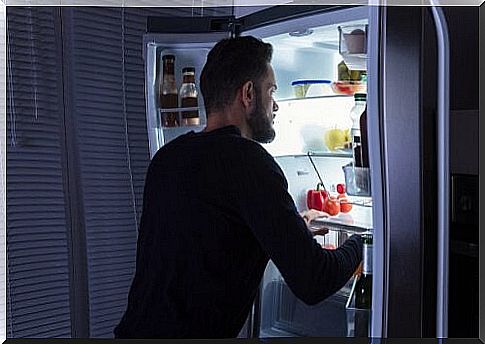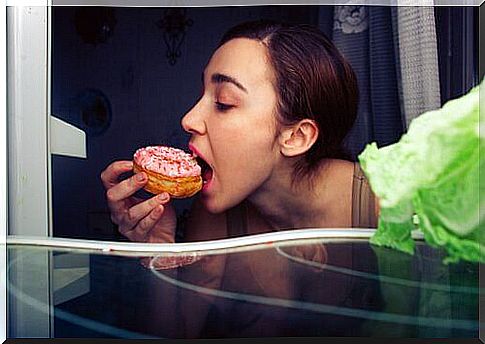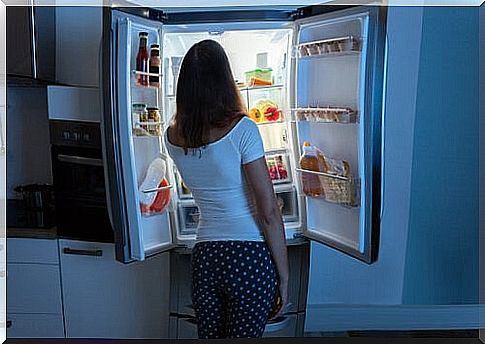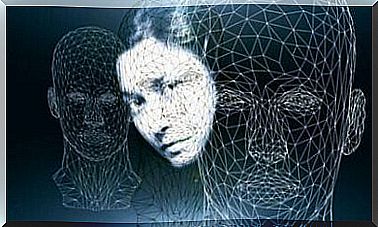Night Feeding Syndrome

We can consider that the nocturnal eating syndrome is part of either the sleep disorder family or the eating disorder family. And this according to the state of consciousness of the person during the episode of compulsive food consumption. In any case, this is a problem that, during the night and after dinner, allows the person to get up and ingest large amounts of food without control. By focusing on foods rich in calories and carbohydrates.
It is estimated to be a disorder affecting 1.5% of the population (Germany, 2014) and having serious health consequences (Zwaan, Muller, Allison, Brahler, & Hilbert, 2014). Therefore, we wanted to talk to you about nocturnal feeding syndrome. Of its manifestation. Causes of this problem. And its treatment. Because although this is a rare problem, it deserves our full attention.
Nocturnal feeding syndrome: what is it and what are its symptoms?
Nocturnal eating syndrome was identified by Dr. Albert Stunkarden in 1955 and is currently considered a sleep disorder and not an eating disorder. The Mental Illness Classification Manual (DSM-5) considers it a disturbance of arousal during slow sleep. Or as an unspecified eating disorder. Depending on the individual’s state of consciousness during the consumption episode. We will see these two cases below.

When consumption takes place during sleep and the person is unaware of it, it is referred to as a sleepwalking subtype. It occurs in phase IV of sleep, characterized by slow waves and very deep sleep. What is happening is that the person gets up and eats compulsively and unknowingly, since they are not conscious. Although she seems awake and can open the refrigerator, chew and swallow. Thus, as in sleepwalking, there is neither awareness of actions nor memories.
On the other hand, when we talk about nighttime consumption during a period in which the person is aware at all times to eat, and therefore remembers it, we are talking about other eating disorders not. specified according to DSM-5 with the name of “nocturnal feeding syndrome”.
In this case, compulsive food consumption also arises, but this behavior is conscious, whereas when nocturnal eating takes place due to sleep disturbances, it is simply a compulsive and nocturnal eating pattern. totally unconscious and motivated by the phase of the dream in which this phenomenon occurs.
What are the symptoms of nocturnal feeding syndrome?
In the case of nighttime drinking related to an eating disorder, it is easy to diagnose the syndrome. Because frequent compulsive eating episodes are observed upon getting up. Or before falling asleep. In other words, it can be observed in the person as if it were an addiction to food : even if he does not want to eat and even if the person continues to lose weight, the episode of bulimia continues. product. Although this is something difficult to admit and recognize, it is observable behavior. Because the person is aware of eating in the middle of the night. And in an uncontrolled way.
However, if nighttime drinking is considered a sleep disorder, the symptoms can be very difficult to identify. The most common way to detect nocturnal eating syndrome as a sleep disorder is by finding the “sleepy” person eating or realizing that they are starting to gain weight. Since this is a problem that occurs in the deep phase of sleep, it is more complicated, even for the affected subject, to be able to be aware of what is going on.
To sum up, nocturnal eating syndrome can be an eating disorder or a sleep disorder. Either way, it is a compulsive food consumption that occurs at night, after dinner. When the person has already eaten and is full. Therefore excluding other psychological or psychiatric problems.
Why is this problem occurring and what are the causes?
In the case of compulsive eating as an eating disorder, the problem arises because food is an escape route from anxiety. And depression. Eating becomes a strategy for coping with discomfort and problems; it is therefore an addiction to food. This is why, within the framework of the night feeding, nothing can appease the person except the ingestion of food.
On the other hand, when the food consumption takes place during sleep, the person can wake up when they are not ready to do so. And then activate its motor system (voluntary movement). But also “automatisms” are set in motion. Such as, for example, walking, talking and eating. This is why most people who eat at night while sleeping are unaware of their behavior and may wake up eating without understanding what they are doing and how it got there.
Either way, nocturnal feeding syndrome is more common in people who are already obese. Generally, it is associated with hormonal imbalances (melatonin and stress hormones). And to neurotransmitters such as serotonin. Therefore, different scientific studies explain how it is possible to effectively treat nighttime eating with drugs such as selective serotonin reuptake inhibitors (SSRIs), administration of melatonin (sleep hormone) and drugs aimed at reduce the stress response (Zapp, Fischer, & Deuschle, 2017).
Overall, imbalances in sleep and circadian rhythm usually lead to nighttime food consumption. The causes of this disorder are multiple and little known. However, it is currently assumed that predominant factors such as anxiety, stress, obesity and circadian diseases. Coping strategies that focus on emotion and not on the problem are also linked. In this case, it is recommended to seek the help of a psychologist.

Treatment of nocturnal feeding syndrome
Intervention on this disorder is multidisciplinary. So, nutritionists can help the person lose weight. Psychiatrists guide her to the necessary medication. And psychologists to facilitate the management of behaviors and emotions. Keep in mind that this is not a purely physical disorder with a single consequence. Such for example as weight gain. Rather, people affected by this syndrome have high levels of anxiety and depressive symptoms and need psychological treatment.
On the other hand, there are a series of behavioral measures such as locking the refrigerator with a key or with a lock. The installation of systems to help the person to wake up if they get up or to prevent them from leaving their room, etc. Likewise, if compulsive eating is considered an eating disorder, it is necessary to perform psychological therapy to treat insomnia. In all cases of night feeding, a series of changes is therefore necessary.








